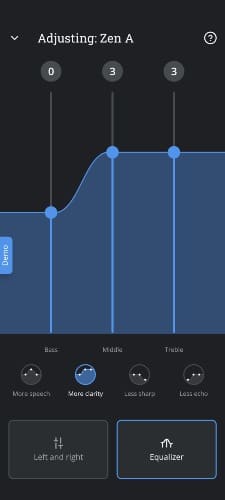Hearing Aids for Tinnitus: A Comprehensive Guide
Key Takeaways
- Tinnitus causes a ringing or whooshing sound in the ear and is a common symptom of hearing loss, but can also be symptomatic of other underlying medical conditions.
- Tinnitus and stress often go hand-in-hand and can lead to decreased cognitive function, anxiety, and depression.
- Tinnitus has no known cure, but hearing aids for tinnitus can help users manage symptoms and find some relief.
- Hearing aids for tinnitus range from $100 per pair for basic devices to more than $7,000 for top-of-the-line prescription hearing aids.
Tinnitus causes ringing, buzzing, clicking, or other sounds in the ear without an external source. Many of the 15%–20% of American adults affected by tinnitus live with it as a chronic condition, and it often goes hand-in-hand with hearing loss.1
You may be wondering if hearing aids can help with tinnitus and how much hearing aids for tinnitus cost. Read our comprehensive guide for answers to these questions, tips on selecting the best hearing aids for tinnitus, and a list of other treatments that can help.
What is tinnitus?
Tinnitus is the medical term used when a person hears sounds in the absence of an outside source, and it’s a common symptom of hearing loss, according to the National Institute on Deafness and Other Communication Disorders (NIDCD).2 The NIDCD reports that close to 25 million Americans have tinnitus. It’s also the No. 1 disability among U.S. Veterans, occurring slightly more often than hearing loss in that population.3
What kind of tinnitus do I have?
Tinnitus falls into two categories that have different characteristics and treatment options.4
1. Subjective
Subjective tinnitus accounts for up to 95% of cases, and it occurs when only you can hear the sound. Most cases of subjective tinnitus are related to hearing loss, and wearing hearing aids can usually provide some measure of relief.5
2. Objective
In some cases, underlying medical conditions can affect the working parts of your ear, causing sounds in the ear that are audible to you and may even be heard by someone else. During a physical exam of the ear, a doctor or audiologist may be able to detect the noise with a microphone or stethoscope.
Pulsatile tinnitus is a somewhat rare subtype of objective tinnitus that may sound like a rhythmic beating, pulsing, or whooshing noise in your ears. It only affects 10% of people with tinnitus, according to the Cleveland Clinic, and it’s most often a symptom of a preexisting medical condition.6

According to the Penn Medicine academic medical center, some of the more common causes of pulsatile tinnitus include narrow or stiff arteries, increased pressure in the skull, abnormalities in blood vessels near the ears, high blood pressure, and other serious underlying medical conditions. 7
If you’re experiencing any symptoms of pulsatile tinnitus, seek medical care.
Tinnitus symptoms
What does tinnitus sound like? While you may hear it referred to as “ringing in the ears,” tinnitus can actually take on a variety of sounds, depending on the person affected and the underlying cause.
Some of the most common tinnitus sounds are:1
- Ringing
- Buzzing
- Hissing
- Clicking
- Roaring
- Rushing
Most people experience bilateral tinnitus, which affects both ears. This is true for Heuer, who hears a ringing sound in both ears equally. “It seems to fill my entire head,” she said. This is different from unilateral tinnitus, in which only one ear is affected.8
Some people experience tinnitus only for a short time, like after attending a large music event or working near loud equipment. Symptoms may subside a few hours later. But tinnitus can also persist for months or years, and it may be constant or occasional. Many people notice symptoms more at bedtime when they aren’t hearing as many other sounds.
The best hearing aids for tinnitus
We asked Murray if a certain style of hearing aid was particularly helpful for tinnitus. He said that rather than the style, a hearing aid’s features and app will determine how much it can help with tinnitus symptoms.
Tinnitus-masking hearing aids
While the sound amplification provided by hearing aids relieves tinnitus for some people, others need additional help. Prescription hearing aids have tinnitus-masking features or apps that play fractal tones ⓘAn unpredictable pattern of melodic notes that resembles wind chimes., a series of soothing sounds that can help take the brain’s focus away from the tinnitus and provide stress relief. Reducing stress has been shown to improve tinnitus symptoms.
“Most prescription hearing aids will have tinnitus programs that you can customize if you need to take it a step further,” said Murray. This can be helpful for people who are distracted or distressed by their tinnitus, as customizable programs allow you or your hearing specialist to program the hearing aid’s fractal tones to match those of the tinnitus sounds you’re hearing.
All of the major prescription hearing aid brands below come with tinnitus-masking features:
- Oticon
- Phonak
- ReSound
- Signia
- Starkey
- Widex
Most Rexton hearing aids, some of which are sold at Costco, also include a tinnitus-masking setting.
These brands all offer a smartphone app you can use to change the volume and listening settings on your hearing aids. By choosing one of the tinnitus management settings, you can activate the tinnitus-masking feature, also called a tinnitus sound generator.
Widex SoundRelax
One brand, Widex, stands apart for its comprehensive approach to tinnitus management. In our review of the best hearing aids on the market, we chose Widex Moment as the “Best for Tinnitus” due to its sophisticated sound therapy.
The brand recently released a new generation of sound therapy tones called SoundRelax for its newest hearing aid models, Widex Moment and Widex Moment Sheer. SoundRelax is a system of fractal tones that are generated by an algorithm within the hearing aids rather than being streamed from an app on your phone. They are popular with people who have tinnitus, but they can also help promote relaxation and concentration in hearing aid wearers without tinnitus.
We spoke with Dana Helmink, senior director of audiological development at Widex USA, to learn more about this feature and how hearing aids can help people with tinnitus. Helmink explained that because the fractal tones in SoundRelax are created algorithmically, they never repeat. This lack of repetition is part of the company’s goal to create a sound therapy option that is designed to help people become accustomed, or habituated, to their tinnitus. “We naturally habituate to things, and this is something we can use to our advantage in tinnitus,” said Helmink.
Studies show that one key to managing tinnitus well is learning to accept the constant sounds, which can help people pay less attention to them.22 The nonrepetitive, soothing SoundRelax tones are designed to distract the brain from tinnitus, promote relaxation and increased focus, and prevent habituation to the SoundRelax tones while promoting habituation to tinnitus sounds.
Your hearing care provider can program up to five SoundRelax programs depending on your needs and preferences. You can also use the Widex Moment app at home to adjust the sounds or turn them off completely.
Helmink said that tinnitus is a highly individual condition, so people use SoundRelax in specific ways according to what they need. “For some people it’s constantly in the background, while others use it more strategically for meditation or relaxation exercises.”
Even without SoundRelax programmed for your hearing aids, the standard Widex Moment app also comes with three tinnitus sound settings, each of which play relaxing tones and can be customized to your preferences. You can choose the tinnitus setting you want and adjust the volume in each ear, along with the bass, treble, and middle-frequency volume, to help you get the most relief.



Each of the major prescription hearing aid manufacturers offers a similar type of smartphone app for tinnitus management. But even if you don’t have a hearing aid with a tinnitus app or the ability to customize your hearing aids to the exact frequencies of your tinnitus sounds, you can still use OTC hearing aids to get relief from tinnitus.
Bluetooth hearing aids
OTC and prescription Bluetooth hearing aids can stream music or other sounds from an app on your smartphone to distract your brain from the tinnitus sounds. Both tinnitus relief apps and other apps, such as those for streaming music, can be helpful in this regard.
But when shopping for hearing aids, keep in mind that Bluetooth streaming is different from simple Bluetooth connectivity. While nearly all prescription hearing aids come with Bluetooth streaming, only some OTC hearing aids offer this feature. Others come with Bluetooth to connect your hearing aids to an app on your phone for making adjustments but don’t allow you to stream audio or take phone calls.
Before you purchase hearing aids, make sure you know what type of Bluetooth capability they have, so you won’t be surprised later. The list below shows some of the best hearing aids with Bluetooth streaming.
Table 1 Hearing aids with Bluetooth streaming
|
Jabra Enhance
Visit Site
|
Lexie
Visit Site
|
Audicus
Visit Site
|
Phonak
Visit Site
|
ReSound
Visit Site
|
Signia
Visit Site
|
|
|---|---|---|---|---|---|---|
| OTC or prescription | OTC | OTC | OTC | Prescription | Prescription | Prescription |
| Models | Enhance Plus, Enhance Pro, Enhance Select 50, Enhance Select 100, Enhance Select 300 | B2 | Wave, Spirit, Omni | All models except Lyric | All models | All models except Silk X |
| Starting price per pair | $799, $1,699, $1,195, $1,495, $1,795 | $999 | $1,398, $1,398, $2,398 | $3,245 | $2,500 | $1,540 |
Tinnitus relief apps
In addition to hearing aid apps with tinnitus management features, a variety of other apps are available for tinnitus. They can be installed on your smartphone to help mask tinnitus sounds, provide stress relief, and help you relax and refocus. Hearing aid companies and others make tinnitus apps that you can listen to with or without hearing aids.
Widex Zen Therapy
In addition to the brand’s integrated SoundRelax program, Widex makes a tinnitus relief app called Widex Zen Tinnitus Management, which can be installed on Android or Apple devices to be used with most Widex hearing aid models, as well as with other brands of hearing aids, earbuds, and Bluetooth speakers.
The Zen app plays soothing fractal tones and is just one part of a four-pronged approach to tinnitus management that Widex has developed, called Widex Zen Therapy. The other three parts are:
- Counseling
- Sound amplification provided by hearing aids
- Relaxation to lower stress
ReSound Relief
Another example is the ReSound Tinnitus Relief App, available for Apple and Android devices for use with ReSound hearing aids. But you can also use the app with earbuds or with a different brand of prescription or OTC hearing aid, as long as they’re Bluetooth-enabled for streaming, or you can use the app without any hearing device at all.
Along with choosing from a variety of preset sound combinations, you can select sounds to create your own setting, which the app will save for later use.
Here, we created a setting called “Outside” by combining the sounds of birds, bubbles, a cavern, crickets, and waves. Click the play button below to hear it yourself.
You can experiment with different combinations to see which sounds help your tinnitus the most. This may involve masking the tinnitus sounds you normally hear or using the sounds to help you relax, both of which will help your brain focus less on the tinnitus and more on the world around you.
The American Tinnitus Association provides a list of other tinnitus management apps for use with iPhones, Androids, and other devices.
What causes tinnitus?
The causes of tinnitus are almost as varied as the symptoms, with the most common cause being age-related hearing loss. See below for a list of other factors that can contribute to the development of tinnitus.1
- Sensorineural hearing loss (SNHL): This is the most common type of age-related hearing loss. More than 80% of people with SNHL also experience tinnitus,5 according to UCSF Health. When a person has hearing loss, damaged cells in the cochlea often send random signals to the brain, which processes these signals as sound, according to the Mayo Clinic.
- Noise-induced hearing loss (NIHL) ⓘNoise-induced hearing loss (NIHL) is caused by exposure to noise at volumes high enough to damage the inner ear or auditory nerve.: A meta-analysis of 222 million American adults found that people frequently exposed to loud noise in their jobs were more likely to have tinnitus than people without noise exposure.9
- Problems in the jaw or neck: For example, temporomandibular joint (TMJ) disorder has been associated with tinnitus in recent research.10
- Underlying medical conditions: This is especially true of conditions affecting the circulatory system, such as high blood pressure and vascular tumors, according to research published in 2022.11
- Stress: Studies show that the presence of mental or emotional stress can cause tinnitus to start and serve as an ongoing trigger of tinnitus symptoms for some people.12
- Medications: Some anti-inflammatories, anti-cancer drugs, antidepressants, and antibiotics have been associated with tinnitus.2
- Smoking: People who smoke are at a higher risk of developing tinnitus.
- Alcohol: Drinking alcohol also raises the risk of this condition.
- Ear wax build-up: Untreated, chronic ear wax build-up can lead to tinnitus.
- Malformation or dysfunction of the ear
- Head trauma
Caffeine and tinnitus
Some people report that caffeine triggers their tinnitus, and this seems plausible since caffeine can increase anxiety and stress levels. But results from clinical studies looking at the relationship between caffeine and tinnitus are inconclusive. One review published in 2021 even found that high caffeine intake may help protect against the development of tinnitus.13
As mentioned above, tinnitus is quite common among U.S. veterans. A 2019 study found that tinnitus is increasing among active duty service members as well, rising more than three-fold between 2001 and 2015.14
Causes of tinnitus among U.S. veterans
Reasons for high rates of tinnitus in the military include noise-induced hearing loss from blasts and loud equipment, brain injuries, and exposure to jet fuel, which has been shown to cause problems with auditory processing.15
Can tinnitus cause other health problems?
Tinnitus doesn’t cause hearing loss, but it can be a symptom of an underlying medical condition, such as those listed above. In addition, studies have linked tinnitus to the following health problems:16,17
- Mental and emotional distress, including posttraumatic stress disorder (PTSD) ⓘPosttraumatic stress disorder (PTSD) is characterized by intense negative thoughts and feelings long after a traumatic event has happened.
- Poor cognitive function
- Changes in cognitive function such as decreased attention to tasks and reduced ability to work
- Substance use disorders
- Decreased attention to tasks
- Reduced ability to work
- Insomnia

While many people with tinnitus also have hearing loss, it’s important to know that tinnitus doesn’t cause hearing loss.18
If you or someone you care for is dealing with tinnitus symptoms that are interfering with daily life, don’t wait to seek help. You can start with an online hearing evaluation or an evaluation at a hearing care clinic to see if you have hearing loss. Also, take a look at the other treatments available for tinnitus below.
Does tinnitus go away?
Tinnitus can be temporary, especially after short-term exposure to loud noise, but in many cases it persists over time. Tinnitus with symptoms lasting more than three months is classified as chronic tinnitus.2 The good news is that hearing aids and other therapies can help reduce how much you notice and are affected by the extra noise in your ears.
Is there a cure for tinnitus?
Tinnitus has no known cure. But it doesn’t occur without a reason in most cases. Rather, it’s usually a symptom of another health problem, with age-related hearing loss being one of the most common.19
Mayo Clinic audiologists recommend that people experiencing tinnitus take the first step by getting a physical exam with a primary care doctor, as well as a hearing exam with an audiologist.20 Successful treatment of hearing loss or any other underlying conditions may clear up or greatly improve tinnitus symptoms.
Along with addressing health issues that could be contributing to tinnitus, a variety of treatments have been shown to improve tinnitus symptoms. This is welcome news for people whose tinnitus persists even after addressing related health problems.
Read on to find out how hearing aids and other treatment plans can help relieve your symptoms and improve your quality of life.
How can hearing aids help tinnitus?
Brian Murray, a hearing instrument specialist and consultant for Alpaca Audiology based in Raleigh, North Carolina, said that many of his patients find that wearing hearing aids provides significant relief from tinnitus.
One reason for this is that when your brain takes in more sounds with the amplification that hearing aids provide, you may not focus as much on the tinnitus sounds.
Hearing aids can also lower your stress levels by reducing the amount of effort needed to hear and understand sounds, especially speech. This, in turn, can help alleviate tinnitus, since stress can worsen tinnitus symptoms.12
And some hearing aids come with tinnitus relief apps to help lessen your symptoms with relaxing tones, distracting sounds, and/or customizable programming capabilities to mask the exact frequencies at which you’re hearing the tinnitus sounds.
Because of the importance of hearing aid features for people with tinnitus, some hearing aids will help more than others. Let’s take a look at factors to consider when selecting the best hearing aids for tinnitus.
How to choose the right hearing aid for tinnitus relief
Jacquelyn Lovitt, an audiologist at Capital Institute of Hearing and Balance in Silver Spring, Maryland, explained that choosing a hearing aid for tinnitus is best done with the guidance of an audiologist.
Prescription vs. OTC hearing aids
A hearing professional can help guide you to a prescription hearing device that best meets your needs for hearing and tinnitus management. But is it necessary to buy a prescription hearing aid if you have tinnitus?
Prescription devices do have some advantages compared to over-the-counter (OTC) hearing aids, particularly when it comes to the following four points:
1. Sound processing
Many prescription hearing devices come with advanced sound-processing functions, like a higher number of channels and artificial intelligence (AI) ⓘ A technology that enables computers and other digital devices to solve problems and learn from experience, tasks that are normally associated with human intelligence., which can help reduce the impact of tinnitus. When AI is used over time it can help the hearing aid learn which sounds to amplify and which to ignore or suppress.
In addition to AI, the more channels a hearing aid has, the more intricately it can divide sound frequencies. This allows the wearer to perceive sounds more accurately and achieve a listening experience closer to how ears naturally process sound. Both functions can make it easier to hear and understand everything in your world, which can lower your stress levels and even help with fatigue, thus lowering the impact of tinnitus.12
Some OTC hearing aids, such as Sontro hearing aids, come in an AI-powered model. Prescription hearing aids that incorporate AI technology include:
- Oticon
- Philips
- Phonak
- Rexton (available in the app for adjustments)
- ReSound
- Signia (available in the app for adjustments)
- Starkey
- Widex
2. Automatic adjustments
Prescription hearing aids also come standard with the ability to automatically adjust as you move from one sound environment to another. When you’re hearing tinnitus sounds constantly, the best sound amplification for each environment can be especially important.
A few OTC brands make devices with an auto-adjust feature, including Eargo and Audicus, but you’ll have to pay more for the models that include this feature.
3. Customization
Prescription hearing aids are designed with software your hearing care professional uses to program the devices to your exact hearing loss profile. They can also make dozens of fine adjustments to the sound frequencies at which you’re experiencing tinnitus. This can make a notable difference in how well the hearing aids treat your tinnitus.
OTC hearing aids, on the other hand, are meant to be used right out of the box without assistance from a hearing professional. Most have preset listening profiles to choose from that have been found to help the majority of people with hearing loss.
Self-fitting OTC hearing aids allow users to fine-tune each listening profile or take a hearing screening using an app. The app will then adjust the hearing aid settings to your hearing screening results.21 But a hearing screening isn’t a full hearing exam, and the adjustments made by the hearing aid aren’t as precise as the sophisticated programming a hearing specialist can provide.
OTC hearing aids can still help tinnitus in many cases, but it’s good to know the technical differences between the OTC and prescription categories to help you decide which type is best for you. Any reputable hearing aid company will give you a risk-free trial period of at least 30 days. During this time, you can try your hearing aids and return them for a refund if they aren’t helping your hearing loss and/or tinnitus.
If a hearing aid company or clinic says they don’t offer a trial period, it’s wise to take your business elsewhere. Read our article on how to avoid OTC hearing aid scams for more tips on finding trustworthy hearing aid suppliers.
4. In-person support
Prescription hearing aids, as mentioned above, are meant to be programmed by a hearing professional. This service can be performed remotely, but the initial programming should be done in person to check your hearing and to ensure the correct physical fit.
OTC hearing aids either come with no support at all after your purchase or only offer remote audiology assistance for adjustments. While this can be sufficient for many people, having both tinnitus and hearing loss presents more complex listening needs compared to someone who has hearing loss without tinnitus.
You may find the personal care provided at a hearing care clinic sets you up for success in treating your hearing needs and dealing with tinnitus. And many hearing care clinics offer one to three years of free support—including cleanings, maintenance, and adjustments—with each hearing aid purchase.
The points above all contribute to the higher price tag found on many prescription hearing aids compared to OTC brands. But if the extra expense isn’t in your budget, some OTC hearing aids can be tailored to help with tinnitus symptoms.
If you’re 18 years or older and have mild or moderate hearing loss, you may be a candidate for OTC hearing aids. They can cost thousands of dollars less than prescription devices, but keep in mind that to treat tinnitus symptoms, the most budget-friendly hearing aids probably won’t offer what you need.
Let’s take a look at hearing aid features that can help with tinnitus and which brands offer models with those features.
Other treatments for tinnitus
In addition to hearing aids and tinnitus relief apps, the following therapies and tools can also help relieve symptoms of this condition.
Sound therapy
Similar to the way a tinnitus relief app works, there are a number of other methods for creating background noise to distract your mind from the tinnitus sounds. Noise machines, fans, water fountains, and nature sounds played on a radio or computer can all help to refocus your brain away from the noise of tinnitus.
Heuer shared the following insight about sounds that alleviate her tinnitus: “I find that white noise ⓘNoise that resembles static and includes all of the audible sound frequencies in equal amounts; also referred to as broadband noise. helps a lot, so I always have a fan running. If the fan isn’t on, I turn on music.” She varies the type of music, ranging from soothing classical to high-energy rock, “depending on whatever my brain needs at any given moment,” she said. “But definitely, having a background sound helps to keep the tinnitus from becoming obtrusive in my life.”
Stress relief
As mentioned above, stress is a tinnitus trigger for many people. And because listening to a constant sound in your ears can also be a source of stress, tinnitus and stress often go hand-in-hand.
Therapies and activities that help lower stress and encourage relaxation have been shown in studies to relieve tinnitus symptoms and improve overall health. Meditation, mindfulness exercises, and journaling are a few ideas that can promote well-being and reduce tinnitus.
Counseling
Both tinnitus and hearing loss can have adverse effects on mental health for people of all ages. Both conditions, for instance, have been linked to anxiety and depression. But counseling or talk therapy can be helpful in many cases.
The Cleveland Clinic has noted that cognitive behavioral therapy (CBT) ⓘA type of talk therapy centered on making positive changes in both thinking and behavior. and acceptance and commitment therapy (ACT) ⓘA type of talk therapy that helps people accept difficult situations and feelings while moving ahead with their lives. have shown success in helping people pay less attention to tinnitus sounds.23 Today, there are more affordable counseling options than in years past, and many providers offer online therapy for people who prefer appointments from the comfort of their home.
Tinnitus retraining therapy (TRT)
This type of therapy joins directive counseling with sound therapy to decrease patients’ negative reactions to tinnitus and help them become accustomed to and accepting of tinnitus sounds. Studies investigating how much TRT improves tinnitus symptoms have yielded mixed results.24
Medications
While tinnitus isn’t treated directly with medications, your doctor may prescribe a drug to help with anxiety, depression, or insomnia if tinnitus is keeping you awake at night.25
The cost of hearing aids for tinnitus
Hearing aids are an expensive purchase, costing anywhere from $100 per pair for basic devices to more than $7,000 per pair for top-of-the-line prescription hearing aids. But with the passage of the FDA’s final rule on OTC hearing aids last year, more affordable hearing aids are now on the market. And as we’ve seen, some of the most budget-friendly options can help with tinnitus.
If you’re looking for hearing aids that provide Bluetooth streaming ability, so that you can use a smartphone app for music or tinnitus-relieving sounds, you’ll need to budget at least $600. And tinnitus-masking features are only available in prescription models at this time, which start at $1,149 per pair.
Do insurance, Medicare, or Medicaid cover hearing aids for tinnitus?
Although hearing aids for tinnitus are expensive, options exist to help reduce the cost.
Medicare
Medicare doesn’t cover hearing aids, but some Medicare Advantage (Part C) plans and other private insurance plans do offer hearing benefits that can help you pay for hearing aids.26 Check with your insurance provider to see if you have a plan with hearing benefits. Medicare also covers audiologist hearing exams and can assess tinnitus and make recommendations for treatment.
Medicaid
Medicaid also offers hearing aid coverage in some states. The Hearing Loss Association of America has published a list of the Medicaid hearing benefits in each state, so you can check to see what’s available where you live.27
Insurance
Unfortunately, private health insurance usually doesn’t cover hearing aids. But in the past few years, more states have begun to mandate that health insurance companies provide hearing coverage. The American Speech-Language-Hearing Association lists the current hearing benefits mandated in each state.28

Use NCOA’s BenefitsCheckUp tool to see potential cost-saving resources and programs in your area.
How can I prevent tinnitus?
Protecting your hearing is one of the most important things you can do to help prevent tinnitus, because the condition is often related to hearing loss.29
Follow these steps to protect your ears:
- Wear hearing protection any time you’re near loud equipment, in music venues, or other noisy situations.
- Cover your ears if a sudden loud noise occurs (such as sirens, honking horns, etc.).
- Use caution with volume when using earbuds, headphones, and other audio equipment.
New technology for tinnitus
Many modern hearing aids are equipped with tinnitus-masking features, such as fractal tones and sound layering. Fractal tones are complex, soothing sounds generated by algorithms, and sound layering is a technique that combines multiple sounds at different frequencies to mask the tinnitus noise.30
The combination of these two stimuli is designed to manage neural activity in the brain, altering the brain’s perception of tinnitus noise and effectively reducing its intensity and the associated distress it causes for some people.
Some hearing aids also come with smartphone and artificial intelligence (AI) integration, which gives them the ability to learn from user preferences and makes it easier for users to adjust their hearing aid settings for optimal tinnitus management. Through dedicated apps, users can personalize the tinnitus-masking sounds they’ll hear, adjust the volume, and even set timers for the sounds to play.
A groundbreaking development in the field of tinnitus management is bimodal neuromodulation.31 This approach, used by the Lenire system, features a combination of auditory and electrical stimulation that’s designed to reduce the perception of tinnitus by modulating neural activity in the brain. The auditory stimulus is typically a series of sounds or tones the user listens to through a device, such as hearing aids or headphones. Somatosensory stimulus, on the other hand, is a form of electrical stimulation that’s applied to the skin.
Lastly, Tinniwell is a new treatment device that combines sound and heat therapy to help manage tinnitus. It uses earphones to deliver soothing sounds that distract the user from their tinnitus symptoms while simultaneously training the brain to ignore sounds at the same frequency of the user’s tinnitus. Gentle heat therapy, via the headphones, helps relax the ear muscles and further minimize symptoms.
Bottom line
Tinnitus can be a bothersome condition at best and a serious interference with daily life at worst. If you’re experiencing constant ringing or other sounds in your ears, make an appointment for a physical exam and an in-person hearing test to investigate possible causes.
By treating any underlying hearing loss or other health conditions, tinnitus can often be alleviated. Advances in hearing aid technology and tinnitus therapies have also created more options for the effective management of this condition.
Have questions about this review? Email us at reviewsteam@ncoa.org.
Frequently asked questions
A hearing aid that effectively treats your hearing loss and has either a tinnitus management app or Bluetooth streaming ability will be the best type for someone with tinnitus. All prescription hearing aids, and some OTC hearing aids (like Jabra Enhance, Audicus, Lucid, and Sony), meet these criteria.
In many cases, tinnitus can be successfully managed with hearing aids. By amplifying the sounds coming into your ear, hearing aids help you focus more on external noise and less on the sounds caused by tinnitus.
Prescription devices that can be programmed for your hearing loss profile and have tinnitus management apps, such as Phonak, ReSound, Oticon, and Widex, are among the best options for high-frequency hearing loss and tinnitus.
But keep in mind that because high-frequency hearing loss is the most common type of age-related hearing loss, a variety of hearing aids are designed to amplify those sound frequencies and will help both hearing loss and tinnitus. If you can’t afford prescription hearing aids and you have mild to moderate hearing loss, an OTC device with Bluetooth streaming ability, such as Jabra Enhance, Lucid, or Audicus, may be helpful in treating your hearing loss and tinnitus.
You can start with either an ENT or audiologist if you’re experiencing tinnitus, but while both will conduct a physical ear exam, an ENT will need to send you to an audiologist for a hearing exam.32
The Mayo Clinic reported that 15%–20% of Americans have tinnitus and that it’s more common in older adults.1
Accepting the sounds that your ears are hearing is one of the best ways to reduce the stress associated with tinnitus and incorporate the sounds into your life. Using therapies such as relaxation techniques, counseling, and sound therapy can also help. Hearing aids with tinnitus-masking features can also reduce tinnitus noise and help your brain focus on other sounds.
A few of the latest treatments for tinnitus include tinnitus retraining therapy and magnetic stimulation.8
Medicare Parts A and B don’t currently cover the cost of any hearing aids, but some Medicare Advantage plans provide coverage for hearing aids. Check with your health insurance provider to see if your plan includes hearing benefits.
While no device can completely stop tinnitus, hearing aids can help you to focus on other sounds and make the noise from tinnitus less noticeable.
Sources
- Mayo Clinic. Tinnitus. Found on the internet at https://www.mayoclinic.org/diseases-conditions/tinnitus/symptoms-causes/syc-20350156
- National Institute on Deafness and Other Communication Disorders. Tinnitus. May 2023. Found on the internet at https://www.nidcd.nih.gov/health/tinnitus
- U.S. Department of Veterans Affairs. Hearing Loss. Found on the internet at https://www.research.va.gov/topics/hearing.cfm#research4
- American Tinnitus Association. Why Are My Ears Ringing? Found on the internet at https://www.ata.org/about-tinnitus/why-are-my-ears-ringing/
- UCSF Health. Tinnitus Signs and Symptoms. Found on the internet at https://www.ucsfhealth.org/conditions/tinnitus/symptoms
- Cleveland Clinic. Pulsatile Tinnitus. Found on the internet at https://my.clevelandclinic.org/health/diseases/23422-pulsatile-tinnitus
- Penn Medicine. Pulsatile Tinnitus. Found on the internet at https://www.pennmedicine.org/for-patients-and-visitors/patient-information/conditions-treated-a-to-z/pulsatile-tinnitus
- Wu V, et al. Approach to Tinnitus Management. Canadian Family Physician. July 2018. Found on the internet at https://www.ncbi.nlm.nih.gov/pmc/articles/PMC6042678/
- Bhatt J, et al. Tinnitus Epidemiology: Prevalence, Severity, Exposures and Treatment Patterns in the United States. JAMA Otolaryngology – Head and Neck Surgery. July 2016. Found on the internet at https://jamanetwork.com/journals/jamaotolaryngology/fullarticle/2533660
- Edvall N, et al. Impact of Temporomandibular Joint Complaints on Tinnitus-Related Distress. Frontiers in Neuroscience. August 2019. Found on the internet at https://www.frontiersin.org/articles/10.3389/fnins.2019.00879/full
- Narsinh K, et al. Management of Vascular Causes of Pulsatile Tinnitus. Journal of NeuroInterventional Surgery. 2022. Found on the internet at https://jnis.bmj.com/content/14/11/1151
- Ciminelli P, et al. Tinnitus: The Sound of Stress? Clinical Practice and Epidemiology in Mental Health. October 2018. Found on the internet at https://clinical-practice-and-epidemiology-in-mental-health.com/VOLUME/14/PAGE/264/
- Aljuaid S, et al. Does Caffeine Intake Increase the Incidence of Tinnitus? A Systematic Review. International Archives of Otorhinolaryngology. November 2020. Found on the internet at https://www.thieme-connect.de/products/ejournals/html/10.1055/s-0040-1718965
- Moore B, et al. Incidence Rates of Tinnitus In Active Duty Military Service Members Between 2001 and 2015. American Journal of Audiology. December 2019. Found on the internet at https://www.ncbi.nlm.nih.gov/pmc/articles/PMC7210435/
- Morata T, et al. Potential Risks to Hearing Functions of Service Members From Exposure to Jet Fuels. American Journal of Audiology. October 2021. Found on the internet at https://pubs.asha.org/doi/10.1044/2021_AJA-20-00226
- Trevis K, et al. A Systematic Review and Meta-Analysis of Psychological Functioning in Chronic Tinnitus. Clinical Psychology Review. March 2018. Found on the internet at https://www.sciencedirect.com/science/article/abs/pii/S027273581730034X?via%3Dihub
- Carlson K, et al. Health Care Utilization and Mental Health Diagnoses Among Veterans With Tinnitus. American Journal of Audiology. April 2019. Found on the internet at https://pubs.asha.org/doi/full/10.1044/2018_AJA-TTR17-18-0042
- Mayo Clinic. Mayo Clinic Q and A: Tinnitus Can Interfere With Hearing But Doesn’t Cause Hearing Loss. May 2015. Found on the internet at https://newsnetwork.mayoclinic.org/discussion/mayo-clinic-q-and-a-severe-tinnitus-can-interfere-with-hearing-but-doesnt-cause-hearing-loss/
- National Institute on Aging. Hearing Loss: A Common Problem For Older Adults. Jan. 2023. Found on the internet at https://www.nia.nih.gov/health/hearing-and-hearing-loss/hearing-loss-common-problem-older-adults
- Mayo Clinic. Mayo Clinic Q and A: Tinnitus Can Interfere With Hearing But Doesn’t Cause Hearing Loss. May 2015. Found on the internet at https://newsnetwork.mayoclinic.org/discussion/mayo-clinic-q-and-a-severe-tinnitus-can-interfere-with-hearing-but-doesnt-cause-hearing-loss/
- Code of Federal Regulations. Self-Fitting Air-Conduction Hearing Aid. May 2023. Found on the internet at https://www.ecfr.gov/current/title-21/chapter-I/subchapter-H/part-874/subpart-D/section-874.3325
- Henry J. Directed Attention and Habituation: Two Concepts Critical to Tinnitus Management. American Journal of Audiology. March 2023. Found on the internet at https://pubs.asha.org/doi/10.1044/2022_AJA-22-00178
- Cleveland Clinic. Pulsatile Tinnitus. Found on the internet at https://my.clevelandclinic.org/health/diseases/23422-pulsatile-tinnitus
- Scherer R and Formby C. Effect of Tinnitus Retraining Therapy vs. Standard of Care on Tinnitus-Related Quality of Life. JAMA Otolaryngology-Head & Neck Surgery. May 2019. Found on the internet at https://jamanetwork.com/journals/jamaotolaryngology/fullarticle/2734346
- National Institute on Deafness and Other Communication Disorders. Tinnitus. May 2023. Found on the internet at https://www.nidcd.nih.gov/health/tinnitus
- Medicare.gov. Hearing Aids. Found on the internet at https://www.medicare.gov/coverage/hearing-aids
- Hearing Loss Association of America. Medicaid. Found on the internet at https://www.hearingloss.org/hearing-help/financial-assistance/medicaid/
- American Speech-Language-Hearing Association. State Mandates for Hearing Aid Coverage. Found on the internet at https://www.asha.org/advocacy/state/issues/ha_reimbursement/
- Centers for DIsease Control and Prevention. Listen Up! Protect your Hearing. Found on the internet at https://www.cdc.gov/nceh/hearing_loss/infographic/
- Simonetti P, et al. Effect of Fractal Tones on the Improvement of Tinnitus Handicap Inventory Functional Scores among Chronic Tinnitus Patients: An Open-label Pilot Study. International Archives of Otorhinolaryngology. March 29, 2018. Found on the internet at https://www.thieme-connect.de/products/ejournals/html/10.1055/s-0038-1635575
- Conlon B, et al. Different Bimodal Neuromodulation Settings Reduce Tinnitus Symptoms in a Large Randomized Trial. Scientific Reports. June 30, 2022. Found on the internet at https://www.nature.com/articles/s41598-022-13875-x
- American Academy of Audiology. Audiologists vs. Hearing Instrument Specialists vs. ENTs. Found on the internet at https://www.audiology.org/consumers-and-patients/what-is-an-audiologist/audiologists-vs-hearing-instrument-specialists-vs-ents/







